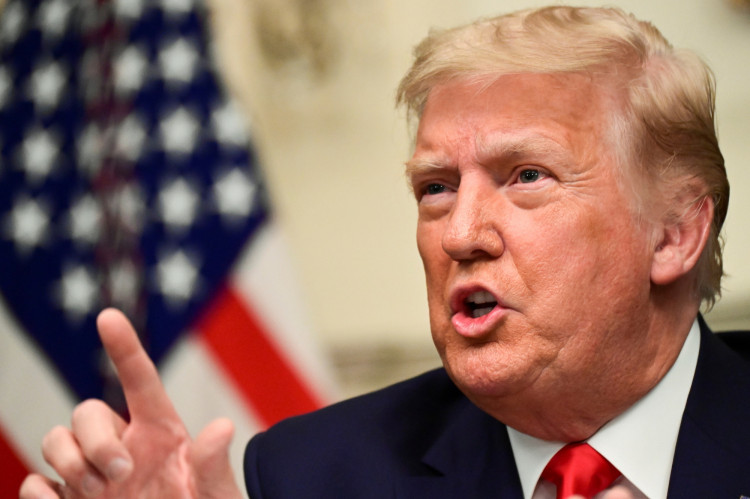At a campaign event ostensibly centered on combating antisemitism, former President Donald Trump made controversial remarks, claiming that Jewish Americans could bear responsibility if he loses the upcoming election. Speaking at the "Fighting Antisemitism in America" event in Washington, D.C., Trump expressed frustration over his polling numbers among Jewish voters and issued a stark warning about Israel's future.
"I'm not going to call this a prediction, but, in my opinion, the Jewish people would have a lot to do with a loss if I'm at 40%," Trump said, referencing an unnamed poll that allegedly showed him with just two-fifths of the Jewish vote. He linked the Jewish community's support-or lack thereof-to the outcome of the November election, suggesting that their votes could be decisive.
Throughout his speech, Trump recounted actions taken during his presidency to strengthen ties between the U.S. and Israel, including moving the U.S. Embassy from Tel Aviv to Jerusalem, recognizing Israeli sovereignty over the Golan Heights, and withdrawing from the Iran nuclear deal. He criticized Jewish voters for not showing more support in return, despite what he described as policies that should have increased his appeal to the community.
"You can't let this happen. Forty percent is not acceptable, because we have an election to win," Trump stated, attributing his struggles with Jewish voters to what he called "the Democrat hold or curse" over them. His remarks suggested that the Democratic Party continues to maintain a strong grip on Jewish voters despite his pro-Israel policies.
Trump also took direct aim at the recent wave of protests on U.S. college campuses, where students have demonstrated against Israel's handling of its war with Hamas. "My first week back in the Oval Office, my administration will inform every college president that if you do not end antisemitic propaganda, they will lose their accreditation and federal tax credit support," he declared, positioning himself as a staunch defender of Israel and Jewish interests.
Later in the evening, Trump doubled down on his remarks at the Israeli-American Council National Summit, warning that if Jewish voters did not rally behind him, it could spell dire consequences for Israel. "If I don't win this election - and the Jewish people would really have a lot to do with that if that happens... Israel, in my opinion, will cease to exist within two years," he claimed, without providing specifics.
These comments reflect Trump's ongoing frustration with the Jewish community's historical support for the Democratic Party. While Trump has made significant efforts to court Jewish voters, including public praise for Israeli Prime Minister Benjamin Netanyahu and hosting him at Mar-a-Lago, polls show that American Jews have largely remained aligned with Democrats. A 2020 Pew Research Center study indicated that 71% of Jewish voters favored Democratic candidates.
Trump's remarks also continue a pattern of controversial statements regarding Jewish voters. During his presidency, Trump criticized Jewish Americans who voted Democratic, saying they showed "either a total lack of knowledge or great disloyalty." More recently, he posted on his social media platform, Truth Social, that "U.S. Jews have to get their act together and appreciate what they have in Israel - Before it is too late!"
As Trump ramps up his campaign for the presidency, he has also targeted high-profile Jewish leaders, including Senate Majority Leader Chuck Schumer and Pennsylvania Governor Josh Shapiro. He described Schumer as being "like a Palestinian," and in a Truth Social post last month, he referred to Shapiro as a "highly overrated Jewish governor."
Despite Trump's repeated appeals, Jewish voters in the U.S. have historically leaned toward Democratic candidates. According to political experts, shifting even a small portion of this vote could make a significant difference in swing states. In Pennsylvania, for example, there are more than 400,000 Jewish residents. In 2020, President Joe Biden won the state by just over 80,000 votes, underscoring the potential impact of Jewish voters in battleground areas.
The Harris campaign was quick to respond to Trump's remarks. Morgan Finkelstein, a spokesperson for Vice President Kamala Harris, criticized Trump's associations with figures known for antisemitic rhetoric. "Trump has shown time and time again that he's willing to align himself with antisemitic individuals, all while trying to use Israel as a political shield," Finkelstein said in a statement ahead of Trump's speech.
Meanwhile, Trump's campaign faces additional scrutiny over its connection to Mark Robinson, a Republican gubernatorial candidate in North Carolina, who recently came under fire for inflammatory comments, including referring to himself as a "black Nazi." Although Robinson has pledged to stay in the race, Trump's team has distanced itself from the candidate while continuing to stress the importance of winning the battleground state.






